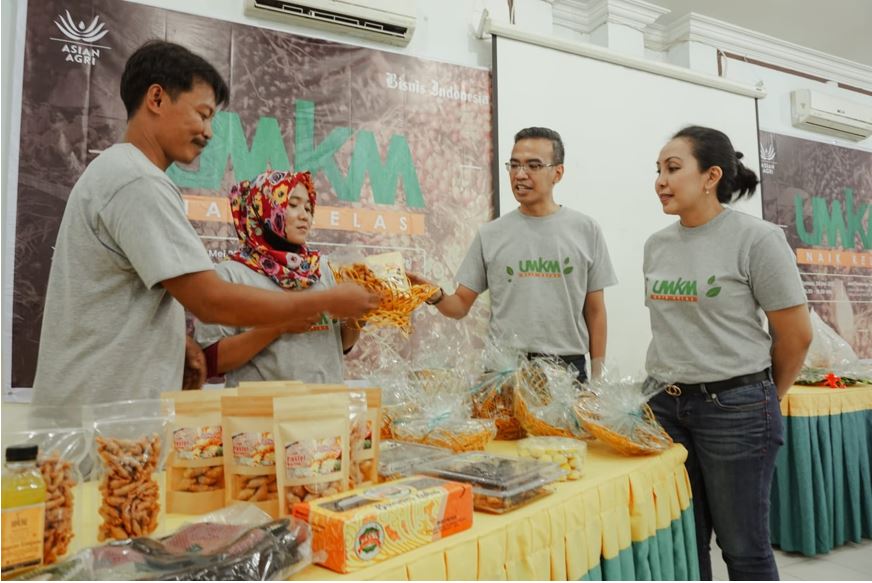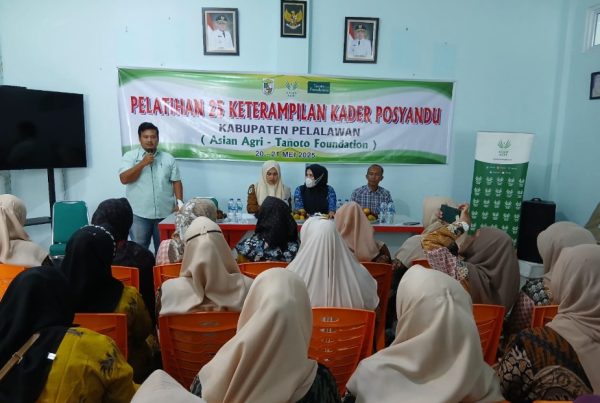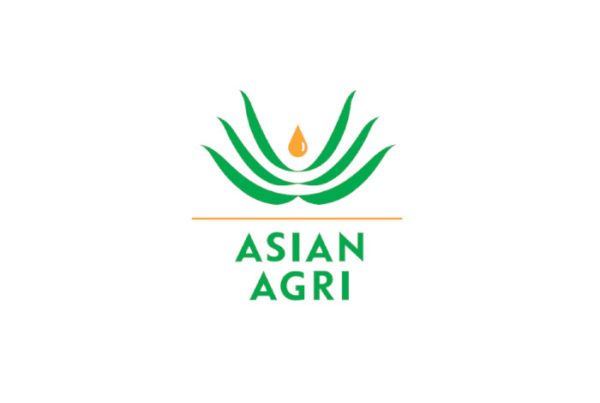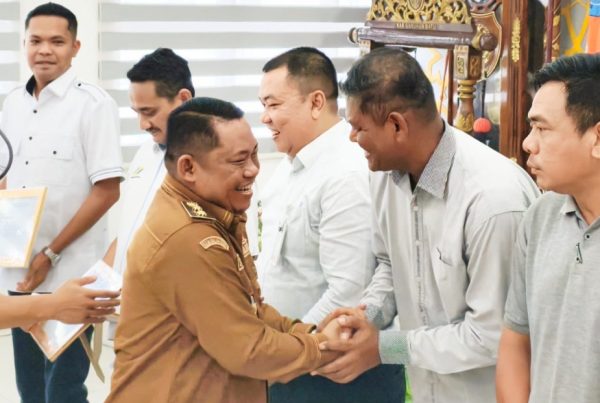Pangkalan Kerinci, 24 May 2022 – Asian Agri, one of the largest oil palm plantation companies in Asia, a member of the RGE group of companies founded by Sukanto Tanoto, announced that it has completed a skills training programme for various micro, small and medium-sized enterprises (MSMEs) located in villages surrounding the Asian Agri’s operations in Riau, North Sumatra and Jambi.

Under the theme ‘Upgrading MSMEs’, representatives from Rumah Tamadun or Tamadun House were invited for the training. Tamadun House has been actively producing MSME products from palm waste sticks, such as bags, plates, tissue boxes amongst others, since 2017.
“With this training, we hope that we will be able to develop their innovation capabilities and marketing skills such that MSMEs nurtured by Asian Agri under this programme will be able to enhance their product quality and sales, and expand their product marketing capabilities,” said Mr Putu Grhyate Yonata Aksa, Asian Agri’s Manager of Sustainability Operations & CSR.
‘Upgrading MSMEs’ is part of Asian Agri’s ongoing efforts in supporting inclusive growth in the villages surrounding the company’s operations, particularly in Riau, North Sumatra and Jambi and it is in line with the company’s sustainability commitment Asian Agri 2030.
“Asian Agri 2030 is a long-term business strategy for the next ten years to ensure business continuity so that it is in line with the company and RGE group’s business philosophy, comprising the 5Cs – Good for Community, Country, Climate, Customer, and Company. Developing MSMEs, as demonstrated by this training programme, is an important goal under Inclusive Growth, one of the pillars under Asian Agri 2030,” added Mr Putu.
The owner of Tamadun House, Mr Hendra Dermawan, explained that business owners changing their way of thinking or perspective in managing their business is key to realising the success of ‘Upgrading MSMEs’.
“These MSME owners typically think of themselves as traders. So I tried to change their mindsets to make them start thinking like entrepreneurs. If the mindset of an entrepreneur can be ingrained in them, their view of the business will widen, and it will not just be about buying and selling,” said Mr Dermawan.
Mr Dermawan also mentioned the need to adopt the strong mentality of an entrepreneur, with the mental capacity to identify the business opportunities that exist from various avenues around him.
“Take an example of a rice cake seller who thinks his sales are normal. But if you believe in the business potential of this product, and you look at other market possibilities, such as selling rice cakes at night, with a little product differentiation, one can bring in additional profits if managed well,” added Mr Dermawan.
Finally, Mr Dermawan urged MSMEs to focus on and encourage the improvement in the quality of their products in order to fast-track their businesses through six development stages, namely licensing, administration, product quality control, personal branding, standard packaging, and marketing through online networks and social media.
“Of course, the most important thing is maintaining a good network with various parties. That’s why I hope this training activity conducted by Asian Agri and Bisnis Indonesia will help all participants to open up their network and increase demand for their products in the future,” said Mr Dermawan.
The MSME training was conducted at AALI (Asian Agri Learning Institute), Mekar Jaya Village, Pangkalan Kerinci District, Kab. Pelalawan. There were altogether 16 MSMEs from Riau, North Sumatra and Jambi participating in this.
“Of the 16 MSMEs who participated in the training, 12 were from villages around Asian Agri’s operations in Pelalawan, with 2 from North Sumatra and 2 from Jambi. We deliberately included MSME owners from villages near the company’s operations in North Sumatra and Jambi so that they can conduct comparative studies and are also able to elevate skills, creativity and business management strategies,” said Mr Eko Budi Christyanto, CSR Coordinator of Asian Agri for the Riau Region.
In addition, Mr Christyanto explained that the MSMEs participating in this training consisted of businesses from different fields.
“We have conducted this MSME training for various fields of businesses, including those selling woven sticks, sharpening sticks, a variety of pastries, cakes, tumpeng and even breeders of duck eggs. The training is aimed to support MSMEs in the villages, so that they can grow and develop. Through this training, we hope that MSMEs in their villages can meet the needs in their areas, and eventually expand outwards by harnessing the potential of their market place,” concluded Mr Christyanto.
About Asian Agri:
Asian Agri is one of Indonesia’s largest palm oil producers. Founded in 1979, the company today manages 100,000 hectares of plantation land and employs over 25,000 people. A pioneer of the Indonesian government’s Trans-National Government Migration (PIR-Trans) program, Asian Agri currently works with 30,000 Plasma Scheme smallholders in Riau and Jambi who operate 60,000 hectares of palm oil plantations, and independent smallholders who manage a total 41,000 hectares.
Implementing a strict “no burn” policy since 1994 and best practices in sustainable plantation management, Asian Agri has helped its smallholder partners improve productivity, yield and supply chain traceability, while assisting them obtain certifications. The company’s mills are technologically advanced and energy self-sufficient, minimizing greenhouse gas emissions.
Asian Agri (PT Inti Indosawit Subur) is a member of the Roundtable on Sustainable Palm Oil (RSPO) since 2006. More than 86% of its owned plantations in North Sumatra, Riau & Jambi provinces and 100% of Plasma Scheme smallholder plantations in Riau & Jambi provinces have been RSPO certified. All its owned plantations and those owned by scheme smallholders ISCC (International Sustainability & Carbon Certification) certified since 2014. In 2019, the company also achieved 100% ISPO (Indonesian Sustainable Palm Oil) certification.
The company’s operations are ISO 14001 certified, while its Learning Institute and nursery research center in Riau province, Indonesia are both ISO 9001 certified. Asian Agri’s laboratory at the Center for Research and Development in Tebing Tinggi is accredited by the National Accreditation Committee under the ILAC Mutual Recognition Arrangement (ILAC MRA).
For further information, please contact:
Lidya Veronica
Media Relations
E-mail: lidya_veronika@www.asianagri.com




